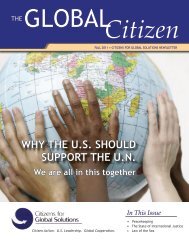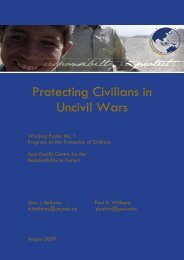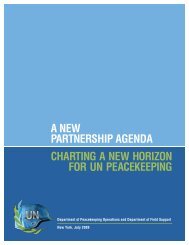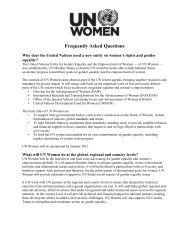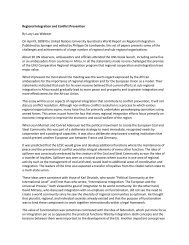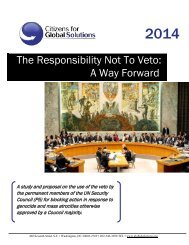Minerva, Spring 2008 (Volume 32) - Citizens for Global Solutions
Minerva, Spring 2008 (Volume 32) - Citizens for Global Solutions
Minerva, Spring 2008 (Volume 32) - Citizens for Global Solutions
You also want an ePaper? Increase the reach of your titles
YUMPU automatically turns print PDFs into web optimized ePapers that Google loves.
jurisdiction will extend over crimes that<br />
are committed over the territory or by the<br />
nationals of over 100 states parties. I can<br />
even say that it would extend to the entire<br />
world because the UN Security Council<br />
can refer a case anywhere in the world to<br />
the International Criminal Court.<br />
But even more important was the decision<br />
by states to give the Prosecutor the ability<br />
to trigger the jurisdiction of the Court.<br />
Certain provisions allow the Court to act<br />
without an additional trigger, meaning the<br />
Prosecutor does not have to wait <strong>for</strong> the<br />
states to refer a case to him, neither does<br />
he have to wait <strong>for</strong> the UN Security Council<br />
to refer a case to him, but the Prosecutor<br />
on his own, where the Court has<br />
subject matter jurisdiction, can move in,<br />
collect in<strong>for</strong>mation and try the case. Why<br />
this is important is that if the Prosecutor<br />
uses this power, it is purely a judicial decision<br />
by the Prosecutor; not by the state;<br />
not by the UN Security Council. This is<br />
the first time that an international tribunal<br />
is able to do that. This is why I think this<br />
is a very defining provision <strong>for</strong> the new<br />
legal framework that we have created <strong>for</strong><br />
ourselves.<br />
Let me again emphasize that the Rome<br />
Treaty was not defined or drafted overnight.<br />
I think that the Rome Statute is a<br />
strong and consistent body of law. The<br />
drafters of the Rome Statute were very<br />
well aware [that] justice in the context of<br />
conflict or peace negotiation would definitely<br />
present difficulties, and they have<br />
prepared the institution well to meet these<br />
challenges. They have made very careful<br />
decisions. For instance, there is a very high<br />
threshold of gravity <strong>for</strong> the jurisdiction of<br />
the Court [where its] jurisdiction was established.<br />
They have created a system of<br />
complementarity which was designed so<br />
that the Court would intervene as a court<br />
of last resort, in that when a state where<br />
the Court has jurisdiction is not able or is<br />
not willing to take action, then the Court<br />
can take action. Again, this is why I said<br />
that a very comprehensive international<br />
criminal justice system was created; it<br />
is not just the Court that we are talking<br />
about. States, I think, have demonstrated<br />
their understanding and have given very<br />
firm support of the Court by the tremendous<br />
speed in which the ICC was ratified.<br />
Within four years … the Rome Statute entered<br />
into <strong>for</strong>ce. For international treaties,<br />
I think this is a precedent.<br />
It is the law. It is the new law. The issue<br />
now that we have is no longer whether we<br />
disagree or we agree with the pursuit of<br />
justice in moral or even in practical terms.<br />
The ICC, the Court, is the law.<br />
In the last 5 years, we have opened investigations,<br />
four investigations in fact. This<br />
is in the Democratic Republic of Congo<br />
(DRC), in Northern Uganda, in Darfur in<br />
the Sudan and in the Central African Republic<br />
(CAR). All of these countries un<strong>for</strong>tunately<br />
are still engulfed in conflicts<br />
of various degrees. We have also analyzed<br />
the situation in Venezuela and we have<br />
analyzed the activities of nationals of 25<br />
states parties that are involved in Iraq. We<br />
are currently monitoring … situations on<br />
three different continents, including Colombia,<br />
Afghanistan, Kenya and in Côte<br />
d’Ivoire in West Africa. In all of these<br />
cases, we have collected evidence and the<br />
Court has protected the witnesses and victims,<br />
and the victims have started participating<br />
in the proceedings. As of today, …<br />
the judges of the International Criminal<br />
Court have issued ten arrest warrants.<br />
After five years, the Rome System is in<br />
motion. It has become an operational tool<br />
to end impunity <strong>for</strong> the crimes that are<br />
committed in violent conflicts all around<br />
the world. The challenge now is how the<br />
decisions of the International Criminal<br />
Court will be implemented by the politicians,<br />
the international community. This<br />
is the challenge that we face. The Prosecutor<br />
often surprises diplomats in The<br />
Hague and in New York and elsewhere<br />
by telling them that the law and international<br />
justice is not just <strong>for</strong> the judges. It<br />
is also not just <strong>for</strong> the prosecutors and the<br />
defense counsel. This is also the law <strong>for</strong><br />
political leaders, military and even the<br />
negotiators. This is the law. We’re saying<br />
that because it is only with their full<br />
commitment that we really can all work<br />
together to prevent the crimes and especially<br />
to consolidate the judicial ef<strong>for</strong>ts<br />
that we are doing now.<br />
35 • <strong>Minerva</strong> #<strong>32</strong> • June <strong>2008</strong><br />
We the Prosecutors, we the lawyers, will<br />
do our part, but we will do it in the courtroom.<br />
It is the political leaders who have<br />
the responsibility to ensure that the law<br />
will be respected by all actors. That is<br />
important. They have a responsibility, I<br />
think, to actively and consistently support<br />
and en<strong>for</strong>ce the decisions of the Court.<br />
The law cannot adjust to political needs;<br />
it is not possible. Others have to adjust. It<br />
is the challenge that we face to show that<br />
we are consistent, especially in the commitment<br />
that we have all made in Rome to<br />
end impunity <strong>for</strong> the massive crimes that<br />
are being committed.<br />
The Prosecutor and we at the Court have<br />
a judicial mandate. The role that we have<br />
is to prosecute those who bear the greatest<br />
responsibility <strong>for</strong> the most serious crimes<br />
where, as I said, based on complementarity,<br />
the national authorities are either<br />
failing to act or are failing to act genuinely,<br />
as we know of sham proceedings<br />
— this is something that can happen. The<br />
aim of our Office is to contribute to the<br />
prevention of such crimes by ending impunity,<br />
by strengthening the rule of law,<br />
especially by highlighting the sufferings<br />
of the victims, and by marginalizing the<br />
most violent leaders that we have today.<br />
What we do, we do in the courtroom and<br />
in the field. But as I said, other actors<br />
have to adjust. What we have to stop doing<br />
is offering impunity to war criminals<br />
or people who may have committed war<br />
crimes, genocide or crimes against humanity<br />
in exchange <strong>for</strong> security, because<br />
when you offer them immunity, you offer<br />
them security. In the framework of the<br />
Rome Statute, these crimes can definitely<br />
no longer be ignored, neither can they be<br />
rewarded.<br />
Sometimes [peace] negotiators … say<br />
that we have taken away from their toolkit<br />
instruments such as amnesty or immunity,<br />
and we always remind them that<br />
such tools at least in most cases did not<br />
work. The Rome Statute was built based<br />
on the failures and the lessons that we<br />
have learned in the past. This was when<br />
the international community failed to prevent<br />
genocide. We also remind them that<br />
the Rome Statute has offered a new tool,<br />
and this is the law. It is the law <strong>for</strong> one; it<br />
is the law <strong>for</strong> all. This is a new law that I<br />
think we all can use to be able to manage<br />
the violence. It is an independent, impar-



